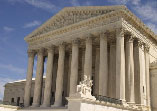|
|
|
Judge Blocks Hawaii Superferry Sailings to Maui
Law Center |
2007/08/28 07:15
|
| A Maui judge today granted a temporary restraining order halting Hawaii Superferry service from Honolulu to the island of Maui until the court can hear evidence Wednesday to determine whether the company can continue sailing without an environmental assessment by the state. Judge Joseph Cardoza is permitting the ferry to sail back to Maui to pick up stranded passengers and transport them to their port of origin. The ferry is in only its second day of commercial voyages between Honolulu, Maui and Kauai. The Superferry was originally scheduled to start sailings on Tuesday, but the company moved the start date to Sunday and issued $5 one-way tickets to launch the service in advance of a legal challenge by environmentalists. More than 90 percent of the available space was filled as passengers rushed to experience Hawaii's first modern interisland ferry service at bargain basement prices. A Superferry spokeswoman said today's Maui and Kauai trips were sold out. The 350-foot vessel can carry more than 850 people and 250 vehicles, but the company projects an average load of 400 passengers and 110 vehicles. The first day of Hawaii Superferry service to the island of Kauai on Sunday was disrupted by hundreds of protesters on surfboards, swimming in the path of the vessel and lining the docks at Nawiliwilil Harbor, in advance of the courtroom battle over environmental issues today. The U.S. Coast Guard intervened after two hours to clear a path for the Superferry to enter the harbor. On Thursday, the Hawaii Supreme Court decided that the state was wrong to have exempted ferry-related improvements at Maui's Kahului Harbor from the state's environmental review law. The Supreme Court ruled on an appeal of an earlier decision by Cardoza dismissing a complaint filed against the Hawaii Department of Transportation by three citizens' groups - the Maui Tomorrow Foundation, the Sierra Club and the Kahului Harbor Coalition. Cardoza had ruled the groups did not have standing to bring the complaint. The Supreme court ruled that they do have standing and in addition ordered an environmental assessment of the harbor improvements. Isaac Hall, the attorney for the groups, hopes to expand the case to involve the Kauai sailings as well. In September 2005, Judge Helen Gillmor dismissed the suit brought by the three groups seeking to require the Superferry to prepare a full Environmental Impact Study, EIS. The groups filed suit after several months of meetings with Superferry head John Garibaldi produced no agreement for an EIS. Other groups, Kauai County and Maui's Mayor and County Council have called for an EIS review as well, but are not parties to the lawsuit. What the Supreme Court ordered Thursday is not an EIS, but a less extensive environmental assessment. Even that could take six months to a year to complete. Concerns range from increased traffic on Maui and Kauai, collisions with whales, impact on campsites and the creation of a new, rapid dispersal method for alien species, the Sierra Club says. Because the court case involves concerns about impacts only at Kahului Harbor, Judge Cardonza's temporary restraining order does not prevent the Superferry from sailing between Honolulu and Kauai. |
|
|
|
|
|
|
Illinois court won't reopen Philip Morris case
Law Center |
2007/08/24 08:51
|
| The Illinois Supreme Court denied requests that would have reopened a case filed by the state's smokers of "light" cigarettes against Philip Morris USA, according to a court document. The 4-2 ruling, posted on the court's Web site on Wednesday, stamps out efforts by plaintiffs to resurrect the failed case against the largest U.S. cigarette maker, a unit of Altria Group Inc. Plaintiffs in the case had sued the company on behalf of Illinois residents who bought light cigarettes since the introduction of Marlboro Lights in 1971. The lower court had found in favor of the plaintiffs and awarded them $10.1 billion in damages, but the decision was overturned by the state Supreme Court, which also directed the lower court to dismiss the action last year. In May this year, however, after the U.S. Supreme Court took up another case against Philip Morris, the circuit court of Madison County asked whether it had jurisdiction to consider the plaintiff's request to set aside the Illinois Supreme Court's judgment in light of new developments. But on Wednesday, the state Supreme Court denied the request and directed the lower court to enter an order dismissing the plaintiffs' motion. Two Illinois Supreme Court justices, however, dissented. "The court's action today is entirely predictable because it quickly and quietly closes the book on a case that a majority of this court, I am sure, would rather forget," Justice Charles Freeman wrote in his dissent. |
|
|
|
|
|
|
Ex-Gov. Ryan will remain free during second appeal
Law Center |
2007/08/22 08:22
|
Former Gov. George Ryan will remain free while he pursues a second appeal of his sweeping fraud and corruption convictions, the 7th U.S. Circuit Court of Appeals ruled late this afternoon. In a crushing legal blow to the former governor earlier today, a three-judge panel from the appeals court denied Ryan's initial appeal 2-1. The judges found that Ryan received a fair trial last year despite a series of juror controversies.
Though Ryan had been allowed to remain free pending that appeal, the court had warned that Ryan and co-defendant Lawrence Warner would have to report to prison within 72 hours if they lost it. Ryan faces a 6 1/2 -year prison sentence.
This afternoon, however, the court stayed that order, finding that Ryan could remain free while a second appeal plays out. Under this afternoon's ruling, Ryan will remain free until the full 7th Circuit—a group of 11 judges—refuses to hear his case or until the full court hears his case and makes a ruling.
A decision on whether the full court would hear Ryan's case could take about six to eight weeks, and a ruling on the case could take until December or January, according to Joel Bertocchi, an attorney who specializes in appellate law.
In pledging to appeal the three-judge panel's decision, Former Gov. James Thompson, a Ryan attorney, noted this afternoon that Judge Michael Kanne issued "a powerful dissent" in which he concluded that the convictions should be overturned and a new trial held.
"No court anywhere has ever deprived a defendant of his life and liberty under these circumstances," Thompson said, alleging that the verdict was unfair because two jurors were replaced during deliberations.
"We believe they reached the wrong result," Thompson said. Ryan, he said, would appeal to the U.S. Supreme Court if necessary.
In its decision this morning, the three-judge panel found that U.S. District Judge Rebecca Pallmeyer acted within her authority when she replaced the jurors after the Tribune revealed they had failed to disclose information about their criminal backgrounds.
"We conclude that the district court handled most problems that arose in an acceptable manner, and that whatever error remained was harmless," Judge Diane Wood wrote for the panel. "We therefore affirm the convictions."
Ryan was convicted in April 2006 on charges that as secretary of state and governor, he doled out sweetheart deals to co-defendant Warner and other friends and used state resources and employees for political gain.
Warner's conviction also was affirmed today. He was sentenced to almost 3 1/2 years in prison.
Thompson said Ryan was disappointed by the three-judge panel's decision but said he is a "strong guy."
"He's been through a lot," Thompson said. "I worry about him and Mrs. Ryan. But he has faith in the judicial system. He's always had that. He has a very supportive family. . . . He'll take it as it comes day by day."
At the Kankakee home of Ryan and his wife, Lura Lynn, their son Homer Ryan answered the door only to say that the family would not discuss the day's events.
Marie Spalding, 69, who has been Ryan's neighbor for 37 years, said the former governor has "always been there for anybody who ever needed help."
"It's the saddest thing that ever could have happened," she said of the appellate court's decision. "He's a wonderful, wonderful man. He's helped out people in this whole neighborhood."
Another neighbor, Denyell Finch, 27, who lives just a few blocks north of Ryan, said she didn't think he should go to jail. "I don't think it's all his fault," she said. |
|
|
|
|
|
|
Researcher Taps High Court Over Samples
Law Center |
2007/08/21 06:34
|
| A Supreme Court justice on Monday rejected a request by a Northwestern University cancer researcher in a dispute over ownership of thousands of blood and tissue samples. Dr. William Catalona spearheaded creation of a repository of more than 3,500 prostate tissue samples and 100,000 blood samples at Washington University in St. Louis. In 2003, he became director of the Clinical Prostate Cancer Program at Northwestern University. Washington University sued to keep the samples, and won several federal rulings. Justice Samuel Alito refused to grant a delay in the federal appeals court decision.
|
|
|
|
|
|
|
High court backs law on driver drug tests
Law Center |
2007/08/15 05:44
|
| The state's highest court upheld a Maine statute yesterday that mandates blood alcohol and drug testing of drivers when a motor vehicle accident results in a fatality. The decision stemmed from a manslaughter case in which a lower court ruled that the results from a blood-alcohol test of a driver were unconstitutional and should be suppressed. The judge ruled that the test results violated the Fourth Amendment protection from "nonconsensual, warrantless and suspicionless searches." The state appealed to the Maine Supreme Judicial Court. In a 34-page opinion, justices issued a 4-to-2 decision, vacating the ruling to suppress the evidence and sending the case back to the lower court for further proceedings. Chief Justice Leigh Saufley wrote that the statute itself is constitutional and that the test results are admissible in court if the state demonstrates that the defendant consented to the test or there was probable cause to believe the driver was operating under the influence of drugs or alcohol. Saufley further wrote that the state's need to obtain information about the intoxication of drivers involved in fatal accidents has to be balanced against the privacy interest of motorists. "We conclude that the state's interest in gathering information to assist in addressing the problem of intoxicated driving outweighs the privacy interest of drivers in the content of their blood," he wrote. Richard Cormier of Gray was driving a car that was involved in a head-on collision on Route 85 in Raymond on May 11, 2003. An elderly couple from Gray was killed in the accident. Cormier was transported by ambulance to a hospital, where his blood was drawn. The blood-alcohol content was 0.08 percent, meaning that he was legally intoxicated. Cormier was later indicted on two counts of manslaughter and other charges, but he moved to suppress the results of the blood test in a court motion. Justice Paul Fritzsche agreed, ruling that Cormier had not consented to the test and that there was not sufficient probable cause to believe he was operating under the influence. Fritzsche found the only justification for the blood test was the state law that mandates a test when an accident has resulted in a fatality. He cited a US Supreme Court decision in declaring the test results as inadmissible in court. Supreme Court Justices Jon Levy and Susan Calkins disagreed with the majority opinion. "The majority's opinion leads the law into new, uncharted territory in which probable cause, a cornerstone of the Fourth Amendment, plays a secondary, after-the-fact role," Levy wrote. "Notwithstanding [the statute's] proper and noble purpose, I conclude that to the extent the statute authorizes searches and seizures based on after-acquired probable cause, the statute is unconstitutional." |
|
|
|
|
|
|
New Orleans politician pleads guilty to bribery
Law Center |
2007/08/14 12:02
|
| A prominent New Orleans politician pleaded guilty on Monday to federal corruption charges and resigned his seat on the City Council. Councilman Oliver Thomas, 50, admitted in court that he had accepted more than $18,000 dollars in kickbacks in 2002 in exchange for helping a businessman retain a lucrative city parking contract in the famed French Quarter. "It was wrong and I accept full responsibility for this action," Thomas told a news conference. "I will continue to work for the city I love and I have made peace with my God." Thomas, a councilman for 13 years and a leading voice for the recovery of the city from the devastation of Hurricane Katrina in 2005, had been expected to be a strong candidate for mayor when the city picks a successor to Ray Nagin in 2010. Before U.S. District Judge Sarah Vance, Thomas pleaded guilty to bribery and faces up to 10 years in prison and $250,000 in fines. However, he has agreed to cooperate with federal prosecutors in an ongoing investigation into corruption in New Orleans. "This guilty plea is a body blow to a community that is already reeling under a wave of public corruption," Vance said at the hearing. "If this city is ever to recover, we have to have an end to this kind of venality." Thomas' troubles are the latest in a city and state, Louisiana, with a history of corruption in politics. U.S. Rep. William Jefferson, a Democrat from New Orleans, was indicted in June on corruption charges linked to business deals in Africa. Investigators found $90,000 in cash in the freezer of his Washington-area home. Jefferson has denied any wrongdoing. U.S. Sen. David Vitter, a Republican from the New Orleans suburbs, admitted last month to having committed a "very serious sin" after his number was found in the phone records of a woman accused of running a Washington prostitution ring. |
|
|
|
|
|
|
Judge: Super Bowl Funds OK for Churches
Law Center |
2007/08/09 05:57
|
| Most of the $736,000 the city promised to three churches as part of a program to clean up the city ahead of the 2006 Super Bowl was justified, but some were not, federal judge has ruled. U.S. District Judge Avern Cohn ruled Wednesday that most of the grants were allowed because any downtown property owner was eligible to apply. He noted that the churches used the grants on lighting, parking lots, sanctuaries and landscaping. But Cohn said some of the money the churches spent on improving large signs and stained glass windows containing religious imagery violated the separation of church and state. It wasn't clear exactly how much grant money would be disallowed under Cohn's ruling. The judge gave both sides until Aug. 28 to discuss how much of the money won't be paid to the churches. New Jersey-based American Atheists, which sued the city, said it may appeal. |
|
|
|
|
|
|
Class action or a representative action is a form of lawsuit in which a large group of people collectively bring a claim to court and/or in which a class of defendants is being sued. This form of collective lawsuit originated in the United States and is still predominantly a U.S. phenomenon, at least the U.S. variant of it. In the United States federal courts, class actions are governed by Federal Rules of Civil Procedure Rule. Since 1938, many states have adopted rules similar to the FRCP. However, some states like California have civil procedure systems which deviate significantly from the federal rules; the California Codes provide for four separate types of class actions. As a result, there are two separate treatises devoted solely to the complex topic of California class actions. Some states, such as Virginia, do not provide for any class actions, while others, such as New York, limit the types of claims that may be brought as class actions. They can construct your law firm a brand new website and help you redesign your existing law firm site to secure your place in the internet. |
Law Firm Directory
|
|









